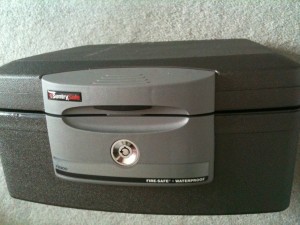 Have you gotten your important papers organized? Do you have them stored in a fireproof, flood proof safe? I recommend this.
Have you gotten your important papers organized? Do you have them stored in a fireproof, flood proof safe? I recommend this.Recently I was helping a couple organize their important papers and thought it was a good topic to blog about.
I suggest you find a good lawyer and get these papers up to date:
A. Durable General Power of Attorney (AKA Financial Power of Attorney)
B. Last Will and Testament
C. Advanced Health Care Directive (AKA Living Will)
Think of it this way, these papers will speak for you when you are no longer able to speak for yourself. Getting up to
date on these documents will require some thought as to whom you want to act and speak on your behalf. And it will require you to decide whom you wish to have as your beneficiaries. This is also a good time to review how things are titled. In the grand scheme of things it’s not that expensive to see a lawyer and update everything and it will give you peace of mind.
date on these documents will require some thought as to whom you want to act and speak on your behalf. And it will require you to decide whom you wish to have as your beneficiaries. This is also a good time to review how things are titled. In the grand scheme of things it’s not that expensive to see a lawyer and update everything and it will give you peace of mind.
When you return from the lawyer, collect these documents and items (this is not a comprehensive list, just a good starting point):
1. Birth Certificates
2. Religious papers
3. Passports
4. Voter registration information
5. Certificates of title for cars
6. School – degrees/certificates
7. Awards information
8. Military information
9. Benefits information
10. Financial information
11. Jewelry appraisals
12. Jewelry that isn’t worn (or isn’t worn often) and you want to keep safe.
13. Jewelry or heirlooms that are from ancestors and are to be passed down – with information on who is to inherit what.
14. Anything you would feel really terrible about if it was lost in a fire – like old letters, photos or mementos, for example.
Put these items in your safe.
Also, create and put in the safe a one-page overall summary of your current information. Date it. List where everything is kept, including bank accounts (hard copy information and websites), safe deposit boxes, retirement accounts, rental/property information, etc.
Place other items in your archives (letters, photos, or mementos) that you want to keep – but aren’t important from a legal point of view.
See you next week with a continuation of Organizing Your Important Papers.
